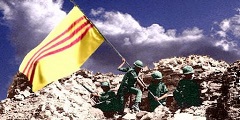The following was compiled/written by Jeff Nyquist.
Russian War Preparations:
* Moscow has outfitted hundreds of fighter-bombers with additional fuel tanks and in-flight refueling capability, augmenting Russia's intercontinental strike capability.
* Russia has been constructing large numbers of military transport aircraft for foreign customers who do not exist.
* Russia has been building and accumulating dry docks even though, at the moment, no foreign customers for them exist.
* Russia has recently fielded a new battle tank; a new state-of-the-art fighter; super-quiet submarines which can engage sea, land and air targets simultaneously; a new attack helicopter and sniper rifle.
* Russia has developed a revolutionary new rifle-fired infantry weapon, the so-called vacuum grenade, which can give a single Russian soldier the firepower of a 155mm howitzer. Russia has begun joint production of this weapon with the Chinese.
* Russia now emphasizes the production of mobile ICBMs like the Topol-M, which are designed to evade satellite detection, permitting the Russians to cheat on arms control agreements.
* Russia continues to develop biological and chemical weapons, sometimes with the use of U.S. funds. According to recent defectors, Russia is now working on a super-plague weapon.
* Russian diplomacy is clearly attempting to build an anti-American alliance which includes countries like China, North Korea, Cuba, Iraq, Libya, South Africa, Syria, Venezuela, Vietnam, Iran and India.
* Russian Spetsnaz commandos continue to train with suitcase nukes against U.S. targets.
* Russia is hoarding strategic metals which are vital for keeping up war production through the first months of a nuclear world war.
* Russia is importing more food than needed for domestic consumption. At the same time, Russia has constructed huge underground nuclear-proof food storage facilities.
* Russia has developed an impressive engineering rescue capability, organized into special military formations positioned outside large cities, for rescuing citizens trapped beneath rubble in the event of a nuclear attack.
* Recent Russian movies and pop songs depict Americans as stupid animals who deserve to die. In keeping with this theme, NATO is depicted as an aggressive alliance, sometimes likened to Hitler's Third Reich.
* Russia is building huge underground cities, like the one at Yamantau Mountain in the Urals. These cities are built more than a thousand feet into the earth and are able to withstand direct nuclear attack.
* Russia has been modernizing nuclear bunkers located beneath Moscow.
* Russia has erected a system of national missile defense far beyond that allowed by the 1972 ABM Treaty. Deploying approximately 10,000 dual-purpose mobile SAM/ABMs, Russia has used a loophole in the treaty to provide a powerful missile shield. Using a common-sense approach to ABM defense, Russia's interceptor missiles employ special nuclear warheads that can destroy incoming warheads without having to score a direct head-on hit.
* Russia is also ahead of the United States in directed energy weapons that could be used to blind or destroy U.S. early warning satellites.
* Many of Russia's mafia organizations operate in collaboration with, or under the supervision of, military intelligence and the state security services. Organized crime is used to penetrate Western banks, technology companies, law enforcement and government. Routes used for smuggling drugs and other contraband are reserved in wartime for bringing biological, chemical and nuclear weapons into the U.S.
Chinese war preparations:
* Civil defense drills began in major Chinese cities last summer.
* Chinese military commanders have been told that nuclear war with America could begin at any time.
* China has been developing and deploying new road-mobile long range missiles like the DF-31 and DF-41.
* China is modernizing its navy, purchasing advanced Russian warships and missiles capable of sinking U.S. carriers.
* China has been rapidly building a large store of advanced nuclear warheads.
* China has positioned bases to block the main western entry point into the Pacific, and has acquired indirect control of the Panama Canal through front companies.
* China has formed military ties with Cuba and Venezuela.
* China has also penetrated Sudan, and is spreading missile and nuclear technology to rogue states in Africa and the Middle East.
* China has massed troops, aircraft, ships and missiles opposite Taiwan.
* China has engaged in war exercises during which U.S. forces in the Pacific were targeted by Chinese forces.
USA War Preparations:
* No civil defense.
* No national missile defense.
* No road or rail-mobile ICBMs.
* Abandonment of the Panama Canal.
* U.S. officials have allowed nuclear warhead secrets to leak out to China.
* The U.S. pays Russia billions of dollars to encourage disarmament measures, but these billions are diverted to Russian war preparations.
* The U.S. Navy is short of fuel.
* The U.S. Army is short of recruits and officers, and has only 10 divisions, with 8 of them unfit for combat.
* The U.S. Air Force is facing pilot shortages, and many aircraft remain grounded for lack of spare parts.
* Only 18 ballistic missile submarines remain in the U.S. Navy, with only 9 at sea on any given day. Many of the missile tubes on these boats are loaded with ballast instead of missiles, due to the START Treaty.
* America's ballistic missile submarine commanders no longer have the launch codes to fire their nuclear weapons, but must rely on the president to send them the launch codes in the event of a war emergency.
* Effective National Civil Defense Program abandoned decades ago and largely non-existent.
* Shop until you drop.
* Wave good-bye to your country.
* Say hello to your new landlords, Mr. Wang and Mr. Russki.




 Reply With Quote
Reply With Quote

Bookmarks